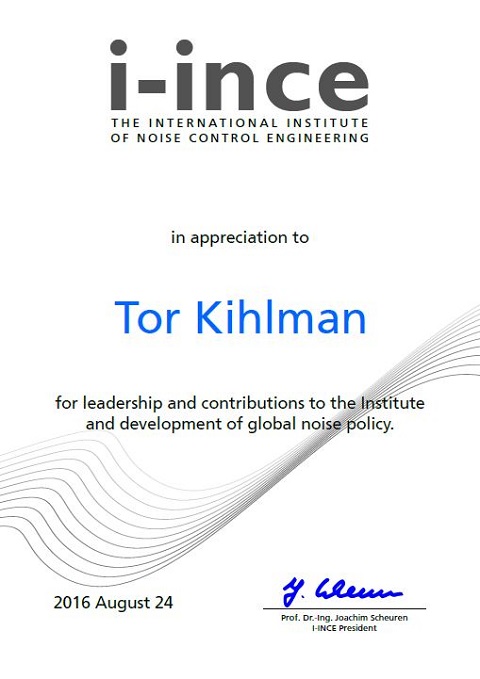Tor Kihlman
Honoring Tor Kihlman at the Closing Ceremony of INTER-NOISE 2016 on August 24, 2016, in Hamburg, Germany
Ladies and Gentlemen, dear colleagues, dear Tor Kihlman,
I am more than happy, I am proud to start this closing session by introducing and honoring one of the fathers of continuity of our institute, Tor Kihlman. I-INCE, the International Institute of Noise Control Engineering, does not have any awards, medals, or whatever predefined expressions of recognition or esteem. But of course we feel free to occasionally express such respect and acknowledgement or, in the case of Tor Kihlman, I should rather say, we even feel under obligation to do so and you will soon know why.
Tor Kihlman was born where he still lives, in Göteborg, Sweden. He stayed there for his academic education at Göteborg’s Technical University, and he further stayed for starting his professional career as a research assistant at Chalmers University of Technology from 1957 to 1966. However, this does not mean at all that he stayed there forever. No, in 1966 he left for three years and went to the Institute of Technology in Lund, Sweden, as Associate Professor in Building Acoustics.
But then, in 1969, he was appointed the real professor as we all know him for 47 years, the Professor in Building Acoustics at Chalmers University of Technology in his city, the city of Göteborg. This appointment was linked to the foundation of a new institute, his institute then, and this foundation had been pushed forward by the need for improved sound quality after a huge building program had been started in Sweden.
It is interesting to see to what extent the revival of acoustics, the turn from a rather physical to an indispensable engineering discipline has been initiated by the crisis of cheap and fast after-war construction and reconstruction. This crisis had to discover soon that simplified construction concepts all the more needed explicit, competent inclusion of acoustic aspects. And this was the spirit of the time then, the time of upcoming and emerging engineering acoustics, where noise control succeeded in finding the temporary interest of politics and administration even.
In my country, in Germany, this was to be seen by regulatory initiatives following the guidelines of professional engineering organizations like the Association of German Engineers, VDI. In the US, this political spirit was driving new national noise control initiatives by the federal government of the USA, thus picking up and contributing to the so-called environmental decade. And in Sweden, it was the time to second a huge building project by a supporting research initiative.
This was the time then to found, starting from the US, INCE and I-INCE in support of the identity, the recognition, and the work of noise control engineers. And I really can imagine, Tor, how your unmistakable sense of political opportunities made you turn this spirit into another institutional initiative at Chalmers, thus essentially contributing to the long-term development of acoustics by establishing and promoting engineering acoustics!
So, although not personally involved yet, you were a companion in spirit of I-INCE from the very beginning and it thus did not take long to make you a companion in action too.
But first, Tor developed his institute at Chalmers and thus made it develop itself a well-known brand, a celebrity in building acoustics, which—due to the long term of 30 active years—gained highest authority among experts and laypersons as well. The positive aura attracted many qualified students and thus set the basis for high technical competence and outreach.
Tor Kihlman’s university career made him dean, then vice president of Chalmers University and later vice president of the university’s board even. And although I lack reliable respective data, I guess you frequently used the platform of upcoming INTER-NOISE congresses, and consequently applied for running your own INTER-NOISE in Göteborg. This was to happen in 1990, then and it happened with great success and made you shine with vigor and creative energy at the height of your power. And made you join the I-INCE board of directors to serve the institute—except for one year—continuously as a board member since then.
The photos given here show you in the role of addressing the delegates of INTER-NOISE 1990 at an event in Göteborg’s concert hall and at a reception in the exhibition hall. They also show you chatting with Manfred Heckl, your colleague in spirit and intention at the Technical University of Berlin then, who died 20 years ago and therefore has been reminded at this year’s conference in a memorial session two days ago.
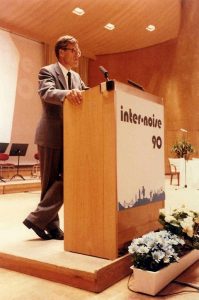
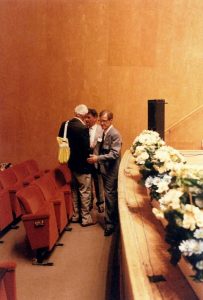
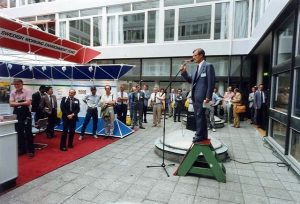
After ten years of director service, Tor Kihlman became the third president of I-INCE from 2000 to 2003, and later a vice president for international relations and global noise policy. This made him act in his second domain of particular talent and aptitude, the political domain, which he was really able to exploit for the interest of acoustics, noise control, and—thereby—I-INCE. Being grown up in a family of political involvement, he naturally found to political and party political activity. And he couldn’t help but apply his respective talents to the benefit of his matter, acoustics, and his institutes at Chalmers and I-INCE.
Apart from serving in university committees, he has strongly pushed forward and took a lead in integrating socio- and sociopolitical aspects into the education of engineers. This was, at that time, a really pioneering concept.
For I-INCE this was a kind of second initial impulse, which turned all accumulated energy and self-consciousness of the institute to increasing external visibility and influence. This gave I-INCE effective links to the European Union as well as to other influential institutions like CAETS, the International Council of Academies of Engineering and Technical Sciences. And this made I-INCE reach many prestigious scientific academies around the world. Tor Kihlman was able to activate these links and make them work to increase the influence and the reputation of noise control engineering and respective associations, in particular I-INCE.
To what extent he succeeded in applying this ability may be seen from the way how he organized his succession at Chalmers. While most universities complicate this process such that it ends up with a significant temporal vacancy, Tor achieved to appoint and employ his successor, Wolfgang Kropp, our technical program chair at this conference here in Hamburg, in advance and thus in parallel.
Tor Kihlman also had great internal influence in I-INCE. He pushed forward the mechanism of regular rotation of mandates, thus insuring personal fluctuation of board members to open up the board for new members and to introduce innovation and alternating experience and networks. He also took guidance in establishing a consensus-driven culture of discussion and decision. And he supported the transition of the I-INCE board of directors from primarily being a group of previously held INTER-NOISE congress chairs to a team of task-related vice-presidents to further promote the affairs of the institute.
Being an emeritus since 1999, he did not retire from following up his technical and—above all—social and political concerns. He kept his office, went on leading projects, for instance, within the MISTRA-program “soundscape support to health” and worked as chairman of the CAETS Noise Control Technology Committee.
MISTRA was a huge interdisciplinary Swedish project running over eight years, involving behaviour science, environmental medicine, and acoustics, and providing the scientific background for the “quiet site” concept.
Apart from the highly reputable MISTRA report, I would like to mention—among his many involvements and projects—the latest example of his highly qualified and respected reports, which reflects the outcome of a one-day I-INCE symposium held in Innsbruck in September 2013: “Quieter Cities of the Future—Lessening the Severe Health Effects of Traffic Noise in Cities by Emission Reductions.”

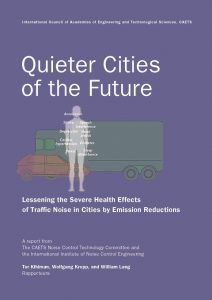
Finally, we should mention that his volunteering included many other institutions besides I-INCE. He became a member of the Royal Society of Arts and Sciences in Göteborg and a member of the Royal Swedish Academy of Engineering Sciences. Tor also served for ten years in the ICA, the International Commission on Acoustics, including four years as chairman. He also was chairman of the Swedish Acoustic Society and he served in quite a few working groups and committees of Swedish and European politics and administration.
Among his private activities, his passion for sailing should be mentioned. We, your colleagues at I-INCE, always enjoyed hearing about the sailing expeditions of the Kihlmans, which were always fit around our summertime INTER-NOISE meetings.
I am really proud to have the chance of recalling the many merits of one of my predecessors here, who—by the way—also is the source of another, completely different proudness because—as an adjunct professor at Chalmers—I had reached the level of being an immediate colleague of him at the Chalmers Institute.
In continuation to the honoring given to Bill Lang and George Maling last year at INTER-NOISE 2015 in San Francisco, I-INCE is proud to continue this this year here in Hamburg again by honoring you! After all I have said, it is obvious that this honoring refers to your leadership and your contributions to the I-INCE and to global noise policy. But how to substantiate this honoring, how to endow it materially? It should be a memento, but should it add to the many articles for shelves you collected during your career already?
We finally decided to help you relive some of your memories in helping you and your fantasies by some specific memory and fantasy enhancer. We felt this might be a nice gift when we heard that you regret not to have had enough great sailing tours during your active sailing time. We thus would like to encourage you to make up for this by memory. We then thought this could be combined by making you memorize the highlights of your I-INCE presidency, the four congresses you lead in the European/African region, Nice and The Hague, in 2000 and 2001, in the Pan-American area, Dearborn in Michigan in 2002, and finally in the Asia-Pacific region, Jeju in South Korea, in 2003.
We thus will send to your home in Göteborg three bottles of excellent wines representing the three regions of the before-mentioned congresses together with a special glass engraved to make you not forget us, the community of noise control engineers—as long as you drink wine at least.
However, to not leave you empty-handed here, we complete this bottle series by a fourth for the first of your four INTER-NOISE congresses, the one in France. We followed advice of well-informed circles that you like good, real champagne, and there it is, a good such bottle to enable you to celebrate yourself wherever you want! Drink it with Margareta, who always appeared to be an impressive and engaging first lady of I-INCE!
Let me congratulate you for receiving this well-earned award, and let me congratulate us for continuously benefitting from the fruits of your many efforts!
Joachim Scheuren
President I-INCE
